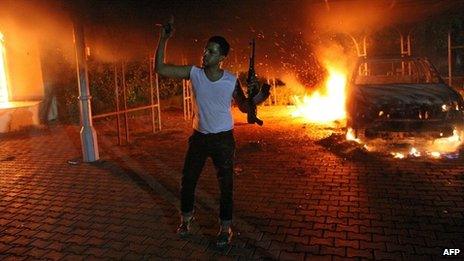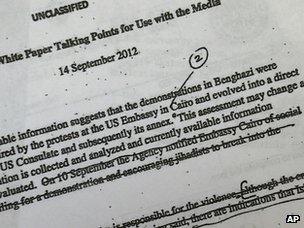White House releases Benghazi 'talking points' emails
- Published

Armed men attacked the US mission in Benghazi last year, witnesses said
The White House has released 99 pages of emails related to the attack on the US diplomatic mission in the Libyan city of Benghazi on 11 September 2012.
The correspondence shows conversations members of the Obama administration had when preparing to brief the media.
The assault by armed men left four Americans dead, including the US ambassador to Libya, Chris Stevens.
Republicans have alleged that the White House sought to play down terrorism ahead of the presidential election.
The Obama administration released the emails on Wednesday in an attempt to quell criticism of its handling of the crisis.
Until now, the White House had declined to make the documents public, instead letting congressional investigators review them without making copies.
'Contradiction'
The 99 pages of emails and a single page of handwritten notes include conversations among members of multiple agencies, including the CIA, state department and the FBI.

The correspondence appears to show that the CIA took the lead in developing the talking points
The correspondence appears to show that the CIA took the lead in developing the talking points and in omitting key information about possible extremist involvement in the attack.
References to al-Qaeda and Libya-based Islamist extremists were removed from the talking points after CIA officials questioned intelligence on who was responsible for the US deaths.
State department spokeswoman Victoria Nuland also expressed reservations, saying: "The line of 'knowing' there were extremists among the demonstrators will come back to us at podium".
Five days after the attack, US Ambassador to the UN Susan Rice used the talking points in controversial appearances on talk shows in which she suggested the assaults sprang from a spontaneous protest over a US-made film depicting the Prophet Muhammad.
On Wednesday, White House spokesman Eric Schultz said the emails "make clear that the inter-agency process... [was] focused on providing the facts as we knew them based on the best information available at the time and protecting an ongoing investigation".
But a spokesman for Republican House Speaker John Boehner said the emails "contradict statements made by the White House that it and the state department only changed one word in the talking points".
"The seemingly political nature of the state department's concerns raises questions about the motivations behind these changes and who at the state department was seeking them," Brendan Buck said.
- Published10 May 2013
- Published10 May 2013